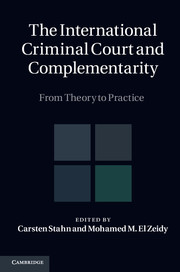Book contents
- Frontmatter
- Contents
- Acknowledgments
- Foreword by HE Judge Sang-Hyun Song
- Foreword by Patricia O’Brien
- Foreword by Silvia A. Fernandez de Gurmendi
- List of abbreviations
- Introduction: bridge over troubled waters?
- PART I General reflections
- PART II Origin and genesis of complementarity
- PART III Analytical dimensions of complementarity
- PART IV Interpretation and application
- 14 The application of the principle of complementarity to the decision of where to open an investigation
- 15 Situation and case: defining the parameters
- 16 The inaction controversy
- 17 The admissibility procedures
- 18 The evolution of the ICC jurisprudence on admissibility
- 19 Interpretative gravity under the Rome Statute
- 20 Complementarity and burden allocation
- PART IV (Continued) Interpretation and application
- PART V Complementarity in perspective
- PART VI Complementarity in practice
- Index
- References
17 - The admissibility procedures
from PART IV - Interpretation and application
Published online by Cambridge University Press: 05 November 2014
- Frontmatter
- Contents
- Acknowledgments
- Foreword by HE Judge Sang-Hyun Song
- Foreword by Patricia O’Brien
- Foreword by Silvia A. Fernandez de Gurmendi
- List of abbreviations
- Introduction: bridge over troubled waters?
- PART I General reflections
- PART II Origin and genesis of complementarity
- PART III Analytical dimensions of complementarity
- PART IV Interpretation and application
- 14 The application of the principle of complementarity to the decision of where to open an investigation
- 15 Situation and case: defining the parameters
- 16 The inaction controversy
- 17 The admissibility procedures
- 18 The evolution of the ICC jurisprudence on admissibility
- 19 Interpretative gravity under the Rome Statute
- 20 Complementarity and burden allocation
- PART IV (Continued) Interpretation and application
- PART V Complementarity in perspective
- PART VI Complementarity in practice
- Index
- References
Summary
Bringing criminals to justice before any court requires a complex body of procedural law. In addition to the procedures needed for conducting the trial as such, the Rome Statute contains procedures for raising, considering and determining the admissibility of cases as well as procedures for their final selection. The complementarity principle can only function as envisaged with detailed procedures in place. Collisions with national jurisdictions will force the International Criminal Court (ICC) Prosecutor into disputes with states which will raise questions very different from those normally associated with criminal proceedings. Sophisticated forms of interaction between states and the Court, unprecedented in the field of international criminal justice, and possibly in any other field of international law, are required. The Rome Statute's procedural regime must address, inter alia, how the Prosecutor may detect national failure to proceed genuinely; how information may flow between the Prosecutor and states; at what stage, how and by whom the admissibility may be challenged; and how and by whom admissibility disputes are to be settled. The complementarity procedures represent a compromise between the need to ensure the ICC's effectiveness and the need to preserve state sovereignty. This dichotomy is even more apparent here than in the substantive provisions. Addressing two inherently conflicting concerns has resulted in a set of rules that is not always equally comprehensive.
Introduction
As noted by Pre-trial Chamber I, the Rome Statute's admissibility test covers two aspects: first, a case is inadmissible if it has been genuinely investigated or prosecuted by a state with jurisdiction over it. Second, the case must be of sufficient gravity. This chapter primarily treats the first aspect, but most of the same proceedings apply also with regard to the second aspect. The discussion is based on a reading of the relevant provisions in the Statute and the Rules of Procedure and Evidence (RPE), in light of the ICC's first years of practice and relevant literature.
- Type
- Chapter
- Information
- The International Criminal Court and ComplementarityFrom Theory to Practice, pp. 503 - 557Publisher: Cambridge University PressPrint publication year: 2011
References
- 3
- Cited by

